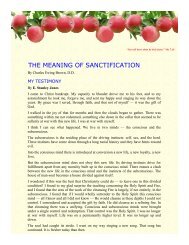W. B. Godbey - Enter His Rest
W. B. Godbey - Enter His Rest
W. B. Godbey - Enter His Rest
You also want an ePaper? Increase the reach of your titles
YUMPU automatically turns print PDFs into web optimized ePapers that Google loves.
souls. It is bad enough for the poor heathen to go into the Ganges and the Jumna to have their sins washed away.<br />
Our hearts break in sympathy as we contemplate them. Then let us not lose sight of the heathen at home, who,<br />
amid the clear light of this Gospel land are so manipulated and deluded by Satan through unconverted preachers,<br />
who are pursuing that business, as many have frankly confessed to me in debate, for a living, like they would<br />
pursue any other employment. It is fearful to contemplate I have been a preacher in my humble way for fiftythree<br />
years. If it would so turn out that I have to go to Hell, I would rather exchange places with the gambler or<br />
the drunkard. Rely upon it, the preacher's Hell is the most awful in all the dismal realms of Satan's dark<br />
pandemonium. A preacher in Hell, forever tormented by the people whom he had led thither, eternally<br />
anathematizing him and lashing him with are brands, as the instrument of their own damnation, how awful!<br />
Again you may ask, were not the people immersed at the house of Cornelius, when Peter opened wide the door<br />
of the Gospel Church to the Gentile world? While he was preaching, you remember the Holy Ghost fell on his<br />
congregation and they had a wonderful shouting time. Some were converted and others sanctified, especially the<br />
latter, as they received the Holy Ghost. Peter said, Acts 10:47, “Whether is any one able to forbid the water that<br />
these should not be baptized who have received the Holy Ghost as well as me?” and he commanded that they<br />
should be baptized in the name of Jesus Christ. Here we have a clear, notable case in favor of effusion. Why?<br />
Because Peter speaks of moving the water to the people, instead of moving the people away to the water. In this<br />
passage we have kolusai hudor, in which hudor, water, is the subject and kolusai the verb, depending on it for its<br />
subject. If it had been immersion, as that was a private house, of course it would have been necessary to go<br />
away to the water. That city is on the sea, which would have been very convenient for immersion. But he says<br />
nothing about going to the water but does speak of moving the water to them. There is no doubt but that the<br />
baptism was administered right there in the house of Cornelius where the Holy Ghost had fallen on the people.<br />
Again, was not Saul of Tarsus immersed? The Scripture certainly favors the conclusion that he received the<br />
ordinance by effusion. He had been three days prostrate on the floor, crying to God for mercy. I have twice<br />
visited the house of Judas on Straight Street in Damascus. There is no immersion water in the house. It is in the<br />
center of that great city. Ananias said to him, “anastas baptisai.” Literally translated, it reads, “standing up, be<br />
baptized.” Ana means up; stas, standing. Paul had been prostrate on the floor three days and nights crying to<br />
God for <strong>His</strong> mercy. Suddenly the wonderful transition out of darkness into light, out of death into life, out of<br />
condemnation into glorious emancipation, supervenes; and meanwhile his blind eyes are miraculously healed<br />
and his soul flooded with the Holy Ghost. Then Ananias says, “standing up, be baptized.” All the facts and<br />
environments involve the conclusion that he rose to his feet and Ananias poured the limpid rill on his head, in<br />
the name of the Father, Son, and Holy Ghost.<br />
Were not the people immersed in Enon where there was “much water”? Enon is a Chaldaic word in the plural<br />
number and means “springs.” Polahudata is the Greek which is translated, E. V., “much water.” The real<br />
meaning of it is, “many waters,” as both the noun and the adjective are in the plural number, hence the<br />
conclusion is that it was a region well supplied with springs. The argument for immersion breaks down of its<br />
own weight because the vast crowds who attended John's meetings needed vastly more water for the people and<br />
the animals to drink and for culinary purposes than was required for immersion. John's meetings anywhere<br />
would need a good supply of water, if he did not baptize at all.<br />
When Nebuchadnezzar spent those seven years roaming ad libitum among the beasts of the field, while his body<br />
was “wet with the dew of heaven,” Dan. 4:33. In the providence of God, through the Septuagint Version of the<br />
Old Testament we have a clear testimony to effusion as a definition of “apto,” which is there translated “wet.”<br />
The Greek ebaphee literally was “baptize with the dews of heaven.” We know that he was not immersed in the<br />
dews of heaven, but they descended on him.<br />
We frankly admit that triune immersion was the prevailing baptism in the long roll of the Dark Ages, extending<br />
from the fourth to the fourteenth century. They not only practiced immersion but gave it to them in a state of<br />
utter nudity without a stitch of apparel on their bodies, arguing that there was no authority for baptizing the<br />
clothes. They also practiced along with it a lot of superstitious ceremonies. The single immersion is quite<br />
modern, beginning in New England when Rodger Williams and Ezekiel Holiman reciprocally immersed each<br />
other.









